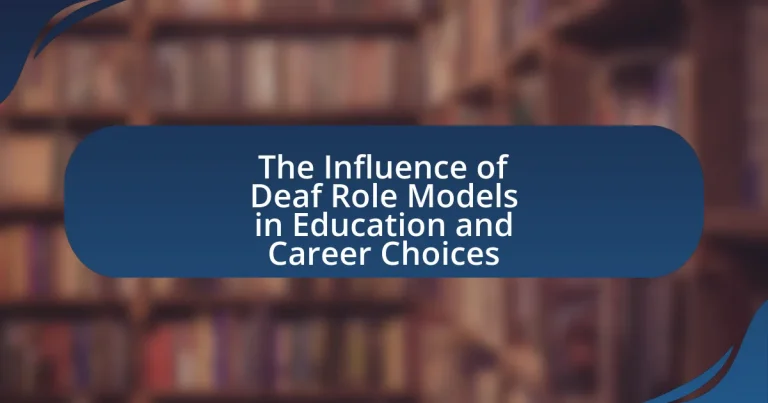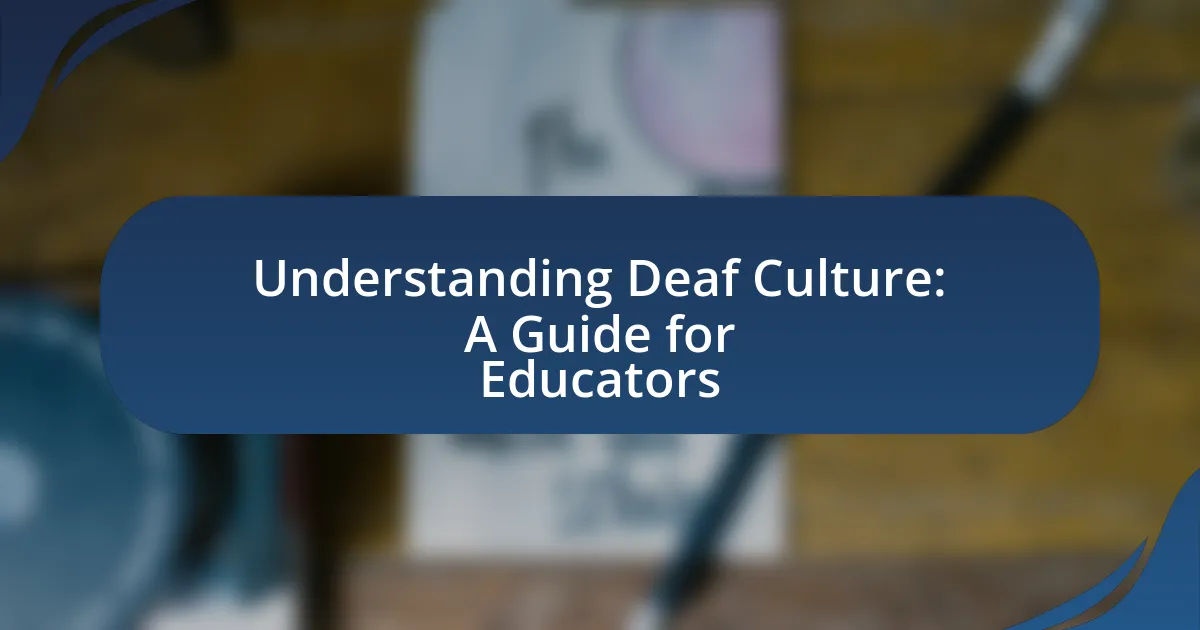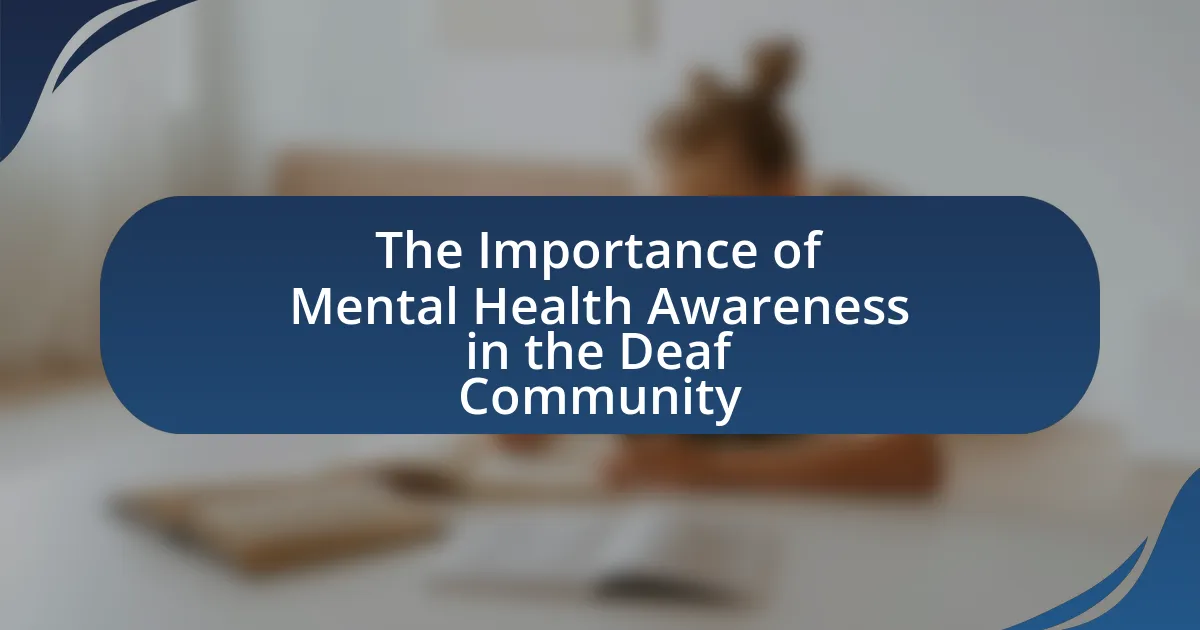The article examines the significant influence of Deaf role models on the education and career choices of individuals who are deaf or hard of hearing. It highlights how exposure to successful Deaf individuals enhances self-efficacy, motivation, and aspirations among Deaf students, leading to improved educational outcomes and career pursuits. Key achievements of Deaf role models in various fields, the challenges they face, and the importance of representation in shaping positive perceptions of career opportunities are discussed. Additionally, the article outlines strategies for educational institutions and communities to support Deaf role models and promote inclusivity, ultimately fostering a sense of belonging and empowerment within the Deaf community.
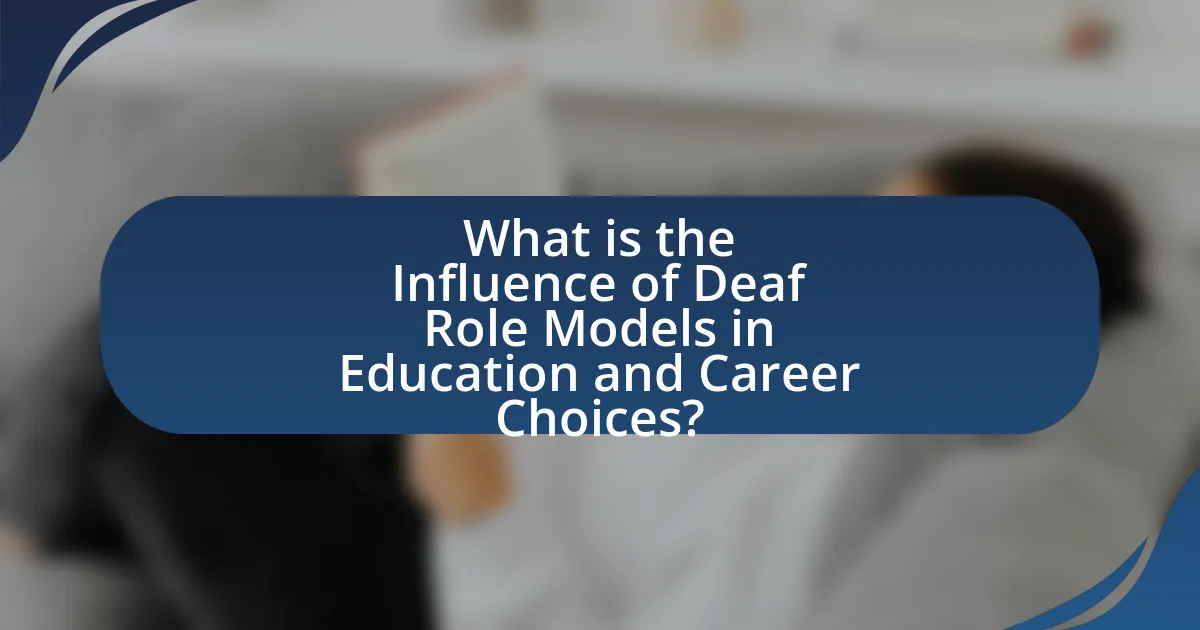
What is the Influence of Deaf Role Models in Education and Career Choices?
Deaf role models significantly influence education and career choices for individuals who are deaf or hard of hearing. Their visibility and success provide inspiration, demonstrating that achieving personal and professional goals is possible despite hearing loss. Research indicates that exposure to successful deaf individuals can enhance self-efficacy and motivation among deaf students, leading to higher aspirations in both academic and career pursuits. For instance, a study published in the Journal of Deaf Studies and Deaf Education found that deaf students who interacted with deaf role models were more likely to pursue higher education and careers in fields such as education, technology, and the arts. This influence is crucial in shaping positive attitudes towards education and career pathways, ultimately fostering a sense of belonging and community among deaf individuals.
How do Deaf role models impact educational outcomes for Deaf students?
Deaf role models significantly enhance educational outcomes for Deaf students by providing relatable examples of success and achievement within the Deaf community. These role models demonstrate that academic and professional success is attainable, which can motivate Deaf students to pursue their educational goals. Research indicates that when Deaf students see individuals who have overcome similar challenges, they are more likely to engage in their studies and develop a positive self-identity. For instance, a study published in the Journal of Deaf Studies and Deaf Education found that Deaf students with Deaf role models reported higher levels of self-esteem and academic motivation compared to those without such role models. This correlation underscores the importance of representation in fostering an environment where Deaf students can thrive academically.
What specific achievements do Deaf role models demonstrate in education?
Deaf role models demonstrate significant achievements in education, including obtaining advanced degrees, excelling in various academic fields, and advocating for inclusive educational practices. For instance, individuals like Dr. I. King Jordan, the first Deaf president of Gallaudet University, earned a doctorate and has been instrumental in promoting access to education for Deaf students. Additionally, Deaf educators often contribute to curriculum development that incorporates Deaf culture and American Sign Language, enhancing the educational experience for all students. These accomplishments highlight the impact of Deaf role models in shaping educational standards and inspiring future generations.
How do Deaf role models inspire confidence in Deaf students?
Deaf role models inspire confidence in Deaf students by demonstrating successful navigation of challenges associated with deafness. Their achievements provide tangible evidence that Deaf individuals can excel in various fields, fostering a sense of possibility among students. For instance, research shows that when Deaf students see role models who have attained higher education or professional success, they are more likely to set ambitious goals for themselves. A study published in the Journal of Deaf Studies and Deaf Education found that exposure to Deaf role models significantly enhances self-esteem and aspirations in Deaf youth, reinforcing the belief that they can achieve similar success.
Why are Deaf role models important in shaping career aspirations?
Deaf role models are crucial in shaping career aspirations because they provide visibility and representation for Deaf individuals in various professional fields. Their success stories demonstrate that achieving career goals is possible despite challenges associated with hearing loss. Research indicates that exposure to role models significantly influences self-efficacy and motivation among Deaf youth, as evidenced by a study published in the Journal of Deaf Studies and Deaf Education, which found that Deaf students who identified with role models were more likely to pursue higher education and diverse career paths. This representation fosters a sense of belonging and encourages Deaf individuals to envision themselves in roles they may have previously thought unattainable.
What career paths do Deaf role models typically pursue?
Deaf role models typically pursue careers in education, advocacy, arts, and technology. Many Deaf individuals become educators or interpreters, leveraging their experiences to teach and support others in the Deaf community. Advocacy roles are common, where they work to promote awareness and accessibility for Deaf individuals. In the arts, Deaf role models often excel as performers, writers, or visual artists, using their unique perspectives to enrich cultural narratives. Additionally, the technology sector sees Deaf professionals in roles such as software development and engineering, where their skills contribute to innovative solutions. These career paths reflect the diverse talents and contributions of Deaf individuals in various fields.
How do Deaf role models influence the perception of career opportunities for Deaf individuals?
Deaf role models significantly enhance the perception of career opportunities for Deaf individuals by providing relatable examples of success and achievement. Their visibility in various professional fields challenges stereotypes and demonstrates that Deaf individuals can excel in diverse careers, thereby inspiring others within the community. Research indicates that exposure to successful Deaf role models positively impacts the aspirations and self-efficacy of Deaf youth, as evidenced by a study published in the Journal of Deaf Studies and Deaf Education, which found that Deaf students who identified with role models were more likely to pursue higher education and career goals. This influence fosters a more optimistic outlook on career possibilities, encouraging Deaf individuals to envision and strive for success in their chosen fields.
What challenges do Deaf role models face in their educational and career journeys?
Deaf role models face significant challenges in their educational and career journeys, primarily due to communication barriers, societal stigma, and limited access to resources. Communication barriers often hinder effective interaction with peers and educators, leading to feelings of isolation and misunderstanding. Societal stigma can result in discrimination, affecting their opportunities for advancement and acceptance in various fields. Additionally, limited access to resources, such as interpreters and specialized training programs, restricts their ability to fully participate in educational and professional environments. These challenges are supported by research indicating that Deaf individuals often experience lower employment rates and higher levels of unemployment compared to their hearing counterparts, highlighting the systemic obstacles they encounter.
How do societal perceptions affect the success of Deaf role models?
Societal perceptions significantly influence the success of Deaf role models by shaping public attitudes and opportunities available to them. Positive societal perceptions can lead to increased visibility and acceptance of Deaf individuals in various fields, thereby enhancing their chances of success. For instance, when society recognizes the capabilities and contributions of Deaf role models, it fosters an environment that encourages inclusivity and support, which is crucial for their professional advancement. Conversely, negative perceptions can result in stereotypes and discrimination, limiting access to resources, mentorship, and career opportunities. Research indicates that role models who are perceived positively can inspire others within the Deaf community, leading to greater educational and career aspirations. Thus, societal perceptions play a critical role in either facilitating or hindering the success of Deaf role models.
What barriers do Deaf role models encounter in professional environments?
Deaf role models encounter several barriers in professional environments, including communication challenges, lack of accessibility, and societal biases. Communication challenges arise from the predominance of spoken language in workplaces, which can hinder effective interaction for Deaf individuals. Lack of accessibility is evident in the absence of sign language interpreters and accommodations, limiting participation in meetings and discussions. Societal biases manifest as stereotypes and misconceptions about Deaf individuals’ capabilities, which can affect hiring decisions and career advancement opportunities. These barriers collectively impede the professional growth and visibility of Deaf role models in various fields.
How can educational institutions better support Deaf role models?
Educational institutions can better support Deaf role models by implementing inclusive programs that promote visibility and accessibility. These programs should include mentorship opportunities, where Deaf individuals can share their experiences and insights with students, fostering a sense of community and aspiration. Additionally, institutions should provide training for staff on Deaf culture and communication methods, such as sign language, to create a more inclusive environment. Research indicates that visibility of role models significantly impacts students’ career choices; for instance, a study by the National Deaf Center found that Deaf students who interacted with Deaf role models were more likely to pursue higher education and professional careers. By prioritizing these initiatives, educational institutions can enhance the representation and support of Deaf role models, ultimately benefiting the entire student body.
What strategies can Deaf individuals adopt to become effective role models?
Deaf individuals can adopt several strategies to become effective role models, including showcasing resilience, promoting advocacy, and engaging in mentorship. By demonstrating resilience in overcoming challenges related to communication and accessibility, Deaf role models can inspire others to persevere in their own journeys. Advocacy for Deaf rights and awareness can further empower individuals within the community, highlighting the importance of representation and inclusion. Additionally, engaging in mentorship allows Deaf individuals to share their experiences and provide guidance to younger generations, fostering a supportive environment that encourages educational and career aspirations. These strategies collectively enhance the visibility and impact of Deaf role models in education and career choices.
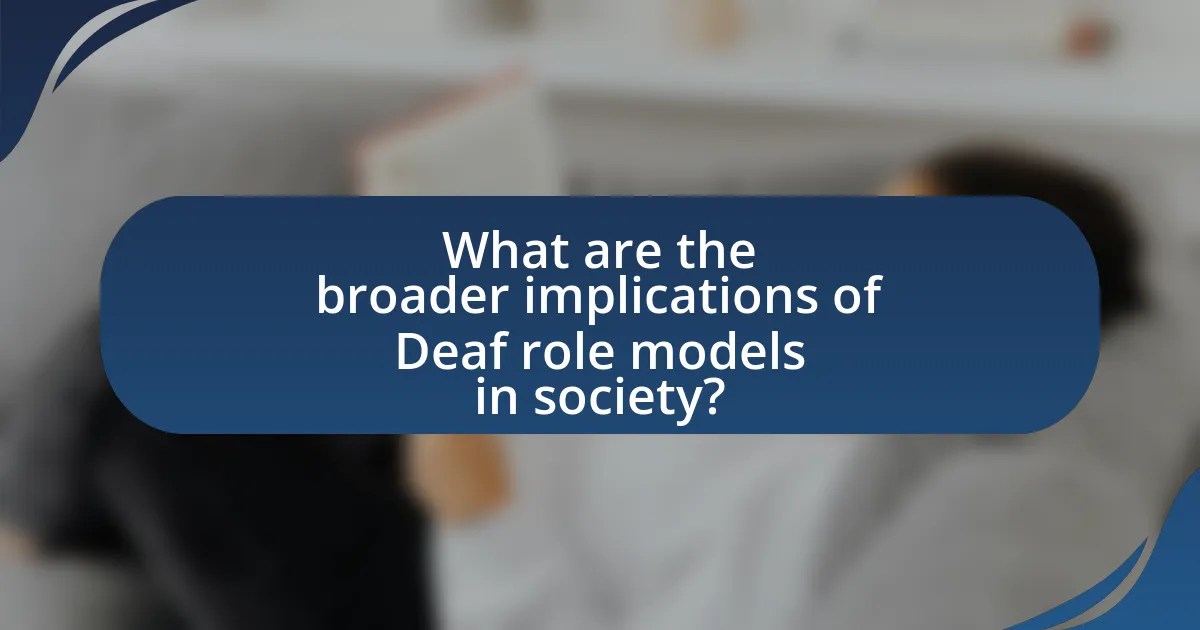
What are the broader implications of Deaf role models in society?
Deaf role models have significant broader implications in society by promoting inclusivity and challenging stereotypes about disability. Their visibility in various fields, such as education, arts, and business, demonstrates that Deaf individuals can achieve success and contribute meaningfully to society. For instance, the success of Deaf leaders like Marlee Matlin in acting and Nyle DiMarco in modeling and advocacy has inspired both Deaf and hearing individuals, fostering a more inclusive perception of Deaf culture. Research indicates that representation of diverse role models can enhance self-efficacy and aspirations among marginalized groups, as seen in studies published by the American Psychological Association, which highlight the positive impact of role models on youth development.
How do Deaf role models contribute to the visibility of the Deaf community?
Deaf role models significantly enhance the visibility of the Deaf community by showcasing successful individuals who navigate both Deaf and hearing worlds. Their achievements in various fields, such as education, arts, and advocacy, challenge stereotypes and demonstrate the capabilities of Deaf individuals. For instance, prominent Deaf figures like Marlee Matlin and Nyle DiMarco have gained national recognition, which not only inspires Deaf youth but also raises awareness among the hearing population about Deaf culture and issues. This visibility fosters a greater understanding and acceptance of Deaf individuals, ultimately promoting inclusivity and representation in society.
What role do media representations play in highlighting Deaf role models?
Media representations play a crucial role in highlighting Deaf role models by increasing visibility and fostering positive perceptions of Deaf individuals. These representations can challenge stereotypes and showcase the achievements of Deaf people in various fields, thereby inspiring others within the Deaf community. For instance, portrayals of successful Deaf individuals in film and television can provide relatable figures for Deaf youth, encouraging them to pursue education and career opportunities. Research indicates that representation in media can significantly influence self-esteem and aspirations among marginalized groups, including the Deaf community, by validating their experiences and potential.
How can community engagement enhance the impact of Deaf role models?
Community engagement can significantly enhance the impact of Deaf role models by fostering a supportive environment that amplifies their visibility and influence. When communities actively involve Deaf individuals in various initiatives, such as mentorship programs or public speaking events, it creates opportunities for role models to share their experiences and successes. This exposure not only inspires Deaf youth but also educates hearing individuals about Deaf culture and capabilities. Research indicates that role models who are actively engaged in their communities can lead to increased aspirations among Deaf students, as evidenced by a study published in the Journal of Deaf Studies and Deaf Education, which found that students with access to Deaf role models reported higher educational and career ambitions.
What lessons can be learned from the experiences of Deaf role models?
The experiences of Deaf role models teach valuable lessons about resilience, advocacy, and the importance of representation. Resilience is demonstrated through their ability to overcome societal barriers and pursue their goals despite challenges, showcasing that determination can lead to success. Advocacy is highlighted as many Deaf role models actively work to promote awareness and accessibility, emphasizing the need for systemic change in education and employment sectors. Furthermore, their visibility in various fields serves as a powerful reminder of the importance of representation, inspiring Deaf individuals to pursue diverse career paths. These lessons underscore the significance of support systems and the impact of role models in shaping aspirations and opportunities for the Deaf community.
How can these lessons be applied to improve educational practices?
Lessons from the influence of deaf role models can be applied to improve educational practices by integrating diverse role models into curricula to enhance student engagement and aspiration. Research indicates that exposure to role models who share similar backgrounds can significantly boost students’ motivation and self-efficacy, particularly in underrepresented groups. For instance, a study published in the Journal of Deaf Studies and Deaf Education found that deaf students who interacted with deaf role models reported increased confidence in pursuing academic and career goals. By incorporating deaf role models into educational settings, schools can create an inclusive environment that fosters a sense of belonging and encourages all students to envision their potential.
What insights can be gained for career development programs?
Insights for career development programs include the importance of representation and mentorship from deaf role models, which can significantly influence the aspirations and career choices of deaf individuals. Research indicates that exposure to successful deaf professionals enhances self-efficacy and motivation among deaf students, leading to higher engagement in educational and career pursuits. For instance, a study by McKee and McKee (2018) found that deaf role models positively impacted the career aspirations of deaf youth, demonstrating that visibility and relatable success stories are crucial for fostering ambition and guiding career paths.

How can we promote the influence of Deaf role models in education and career choices?
Promoting the influence of Deaf role models in education and career choices can be achieved through targeted outreach programs and inclusive curricula. Educational institutions can invite Deaf professionals to speak about their experiences, thereby providing students with relatable success stories. Research indicates that exposure to role models significantly enhances students’ aspirations; for instance, a study by the National Deaf Center found that Deaf students who interacted with Deaf role models were more likely to pursue higher education and career opportunities. Additionally, integrating Deaf culture and achievements into educational materials fosters a sense of belonging and motivation among Deaf students, reinforcing the importance of representation in various fields.
What initiatives can be implemented to elevate Deaf role models?
To elevate Deaf role models, initiatives such as mentorship programs, visibility campaigns, and educational workshops can be implemented. Mentorship programs can connect Deaf individuals with established Deaf professionals, fostering guidance and support in career development. Visibility campaigns can highlight successful Deaf individuals in various fields through media and public speaking engagements, thereby increasing representation and inspiring younger generations. Educational workshops can focus on career skills and personal development, equipping Deaf individuals with the tools needed to succeed. Research indicates that representation significantly impacts career aspirations; for instance, a study by the National Deaf Center found that Deaf students with role models are more likely to pursue higher education and professional careers.
How can mentorship programs be structured to support Deaf individuals?
Mentorship programs can be structured to support Deaf individuals by incorporating Deaf mentors who share similar experiences and communication styles. This approach fosters a relatable environment, enhancing engagement and understanding. Research indicates that mentorship relationships significantly improve career outcomes for Deaf individuals, as evidenced by a study published in the Journal of Deaf Studies and Deaf Education, which found that Deaf mentees reported higher levels of confidence and career satisfaction when paired with Deaf mentors. Additionally, mentorship programs should provide training for hearing mentors on Deaf culture and communication methods, such as sign language, to ensure effective interaction and support.
What role do organizations play in promoting Deaf role models?
Organizations play a crucial role in promoting Deaf role models by providing platforms for visibility and advocacy. These entities often create programs that highlight the achievements of Deaf individuals, thereby inspiring others within the community. For instance, organizations like the National Association of the Deaf (NAD) actively showcase Deaf leaders through events, social media campaigns, and mentorship programs, which help to normalize the presence of Deaf individuals in various professional fields. Research indicates that exposure to role models significantly influences the aspirations and career choices of Deaf youth, as demonstrated in studies published by the Journal of Deaf Studies and Deaf Education, which found that role models can enhance self-efficacy and motivation among Deaf individuals.
What practical steps can individuals take to become role models in their communities?
Individuals can become role models in their communities by actively engaging in volunteer work, promoting inclusivity, and sharing their personal experiences. Engaging in volunteer work allows individuals to demonstrate commitment to community improvement, which can inspire others to contribute as well. Promoting inclusivity, particularly for marginalized groups, fosters a supportive environment that encourages diverse participation. Sharing personal experiences, especially in overcoming challenges, can motivate others facing similar situations, illustrating that success is attainable. Research indicates that role models significantly influence the aspirations and choices of individuals, particularly in educational and career contexts, highlighting the importance of visible, relatable figures in shaping community dynamics.
How can personal storytelling be used to inspire others?
Personal storytelling can inspire others by sharing authentic experiences that resonate emotionally and provide relatable insights. When individuals recount their journeys, particularly in overcoming challenges, they create connections that motivate listeners to pursue their own goals. Research indicates that narratives can enhance empathy and understanding, making the experiences of deaf role models particularly impactful in educational and career contexts. For instance, a study published in the Journal of Deaf Studies and Deaf Education highlights how deaf individuals sharing their stories can empower peers to navigate similar obstacles, fostering a sense of community and encouragement.
What resources are available for Deaf individuals aspiring to be role models?
Deaf individuals aspiring to be role models can access various resources, including mentorship programs, educational workshops, and community organizations. For instance, the National Association of the Deaf offers resources that connect Deaf individuals with mentors in various fields, providing guidance and support. Additionally, organizations like Deaf Youth USA provide leadership training and opportunities for networking, which are crucial for personal and professional development. Research indicates that mentorship significantly impacts career choices and educational outcomes for Deaf individuals, highlighting the importance of these resources in fostering role models within the community.
